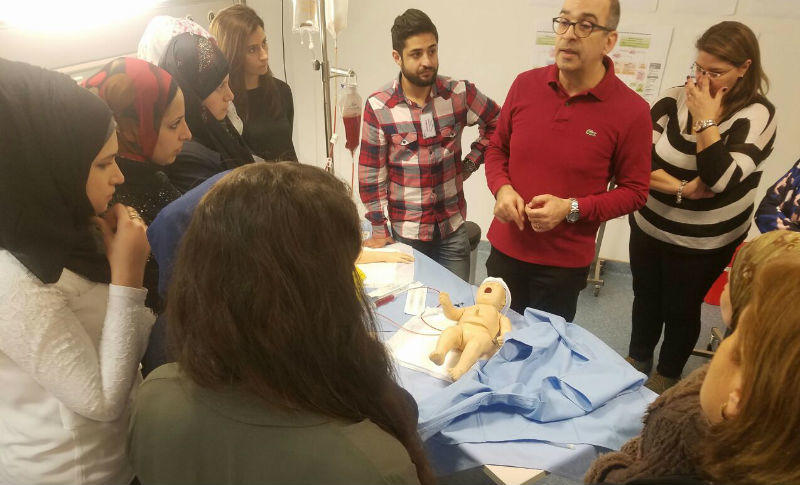Simulation Center Hosts Training on Neonatal Emergencies
The first course of its kind in Lebanon helps neonatologists achieve mastery in the field.
LAU’s Clinical Simulation Center hosted a two-day practical training course specifically targeting the management of neonatal and pediatric emergencies. The course is the first of its kind in Lebanon, and it aims to teach health professionals technical and non-technical skills through repetitive practice to mastery learning.
Clinical Simulation Center Director Dr. Vanda Abi Raad believes in the value of simulations. “The goal for healthcare professionals is to achieve mastery learning, which can only be accomplished through practice and scenarios that increase in difficulty.”
The benefits of simulations go beyond technical training. Dr. Ninette Hawat, clinical instructor of pediatrics at the Gilbert and Rose-Marie Chagoury School of Medicine and the course’s facilitator, highlighted areas where healthcare professionals can hone their soft-skills set: “Simulations are designed to build participants’ confidence; doctors and nurses must manage the psychological component of their work, and practical simulations address that.”
Dr. Maroun Matar, assistant professor and head of the Neonatology Division at the School of Medicine, agreed that simulation is a key component in medical training. “Through simulations, healthcare professionals gain experience in team management to provide standardized care, which ultimately leads to better patient outcomes.”
Other LAU instructors present were Dr. Abeer Hani, a pediatric neurologist, and Dr. Krystel Malek, a pediatric anesthesiologist.
The course was attended by neonatologists, pediatricians, nurses and medical residents from across Lebanon. Sally Azwat, a practicing nurse, was a first-time participant at the Clinical Simulation Center. “I didn’t expect it to be so real, but I know the stress I felt [during the simulation] has a positive result.” Pediatrician Dr. George Zemter said, “This course gives [healthcare professionals] a unified approach to managing critical neonatal situations.”
The Clinical Simulation Center, housed in the Chagoury Health Sciences Center on LAU’s Byblos campus, features highly advanced replications of hospital environments. The center is outfitted with state-of-the-art neonatal and pediatric equipment provided by a grant from the American Schools and Hospitals Abroad program to provide the highest quality simulation experience. “High-fidelity models” are programmed to perform and respond as humans would in the center’s unique training scenarios, giving trainees a life-like experience and invaluable preparation.
